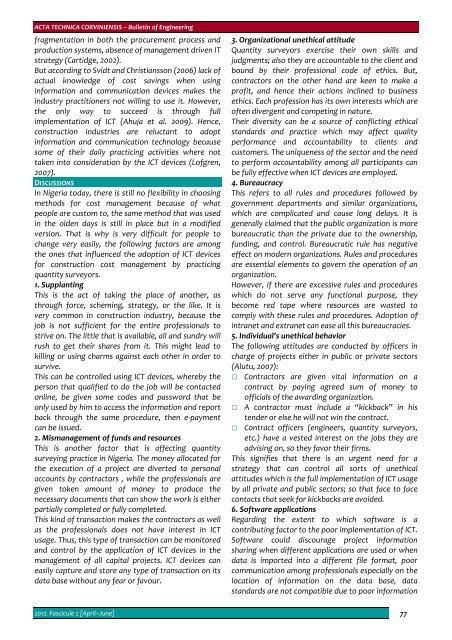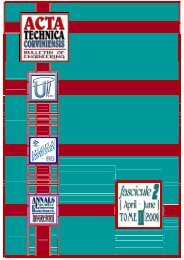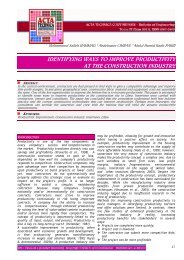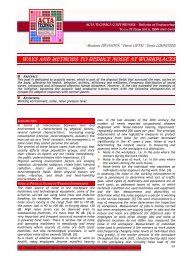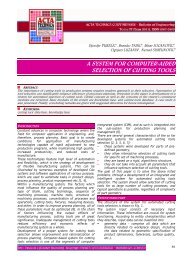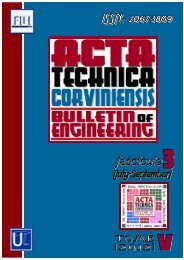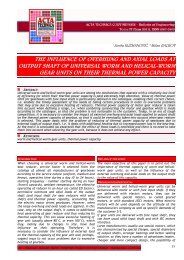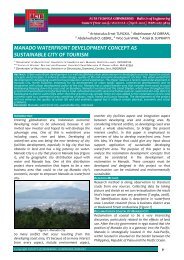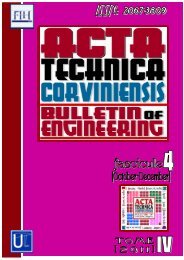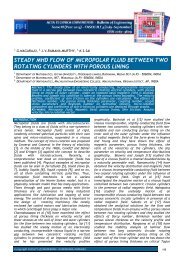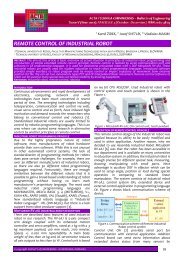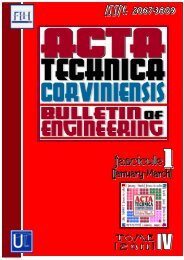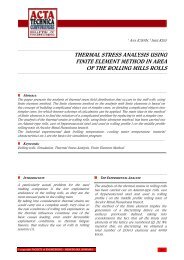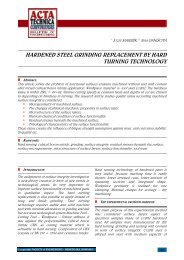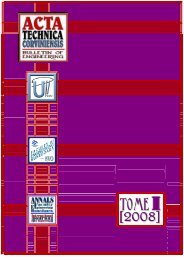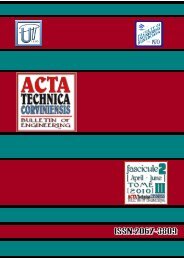Editorial & Advisory Board - Acta Technica Corviniensis
Editorial & Advisory Board - Acta Technica Corviniensis
Editorial & Advisory Board - Acta Technica Corviniensis
Create successful ePaper yourself
Turn your PDF publications into a flip-book with our unique Google optimized e-Paper software.
ACTA TECHNICA CORVINIENSIS – Bulletin of Engineering<br />
fragmentation in both the procurement process and<br />
production systems, absence of management driven IT<br />
strategy (Cartidge, 2002).<br />
But according to Svidt and Christiansson (2006) lack of<br />
actual knowledge of cost savings when using<br />
information and communication devices makes the<br />
industry practitioners not willing to use it. However,<br />
the only way to succeed is through full<br />
implementation of ICT (Ahuja et al. 2009). Hence,<br />
construction industries are reluctant to adopt<br />
information and communication technology because<br />
some of their daily practicing activities where not<br />
taken into consideration by the ICT devices (Lofgren,<br />
2007).<br />
DISCUSSIONS<br />
In Nigeria today, there is still no flexibility in choosing<br />
methods for cost management because of what<br />
people are custom to, the same method that was used<br />
in the olden days is still in place but in a modified<br />
version. That is why is very difficult for people to<br />
change very easily, the following factors are among<br />
the ones that influenced the adoption of ICT devices<br />
for construction cost management by practicing<br />
quantity surveyors.<br />
1. Supplanting<br />
This is the act of taking the place of another, as<br />
through force, scheming, strategy, or the like. It is<br />
very common in construction industry, because the<br />
job is not sufficient for the entire professionals to<br />
strive on. The little that is available, all and sundry will<br />
rush to get their shares from it. This might lead to<br />
killing or using charms against each other in order to<br />
survive.<br />
This can be controlled using ICT devices, whereby the<br />
person that qualified to do the job will be contacted<br />
online, be given some codes and password that be<br />
only used by him to access the information and report<br />
back through the same procedure, then e‐payment<br />
can be issued.<br />
2. Mismanagement of funds and resources<br />
This is another factor that is affecting quantity<br />
surveying practice in Nigeria. The money allocated for<br />
the execution of a project are diverted to personal<br />
accounts by contractors , while the professionals are<br />
given token amount of money to produce the<br />
necessary documents that can show the work is either<br />
partially completed or fully completed.<br />
This kind of transaction makes the contractors as well<br />
as the professionals does not have interest in ICT<br />
usage. Thus, this type of transaction can be monitored<br />
and control by the application of ICT devices in the<br />
management of all capital projects. ICT devices can<br />
easily capture and store any type of transaction on its<br />
data base without any fear or favour.<br />
3. Organizational unethical attitude<br />
Quantity surveyors exercise their own skills and<br />
judgments; also they are accountable to the client and<br />
bound by their professional code of ethics. But,<br />
contractors on the other hand are keen to make a<br />
profit, and hence their actions inclined to business<br />
ethics. Each profession has its own interests which are<br />
often divergent and competing in nature.<br />
Their diversity can be a source of conflicting ethical<br />
standards and practice which may affect quality<br />
performance and accountability to clients and<br />
customers. The uniqueness of the sector and the need<br />
to perform accountability among all participants can<br />
be fully effective when ICT devices are employed.<br />
4. Bureaucracy<br />
This refers to all rules and procedures followed by<br />
government departments and similar organizations,<br />
which are complicated and cause long delays. It is<br />
generally claimed that the public organization is more<br />
bureaucratic than the private due to the ownership,<br />
funding, and control. Bureaucratic rule has negative<br />
effect on modern organizations. Rules and procedures<br />
are essential elements to govern the operation of an<br />
organization.<br />
However, if there are excessive rules and procedures<br />
which do not serve any functional purpose, they<br />
become red tape where resources are wasted to<br />
comply with these rules and procedures. Adoption of<br />
intranet and extranet can ease all this bureaucracies.<br />
5. Individual’s unethical behavior<br />
The following attitudes are conducted by officers in<br />
charge of projects either in public or private sectors<br />
(Alutu, 2007):<br />
Contractors are given vital information on a<br />
contract by paying agreed sum of money to<br />
officials of the awarding organization.<br />
A contractor must include a “kickback” in his<br />
<br />
tender or else he will not win the contract.<br />
Contract officers (engineers, quantity surveyors,<br />
etc.) have a vested interest on the jobs they are<br />
advising on, so they favor their firms.<br />
This signifies that there is an urgent need for a<br />
strategy that can control all sorts of unethical<br />
attitudes which is the full implementation of ICT usage<br />
by all private and public sectors; so that face to face<br />
contacts that seek for kickbacks are avoided.<br />
6. Software applications<br />
Regarding the extent to which software is a<br />
contributing factor to the poor implementation of ICT.<br />
Software could discourage project information<br />
sharing when different applications are used or when<br />
data is imported into a different file format, poor<br />
communication among professionals especially on the<br />
location of information on the data base, data<br />
standards are not compatible due to poor information<br />
2012. Fascicule 2 [April–June] 77


